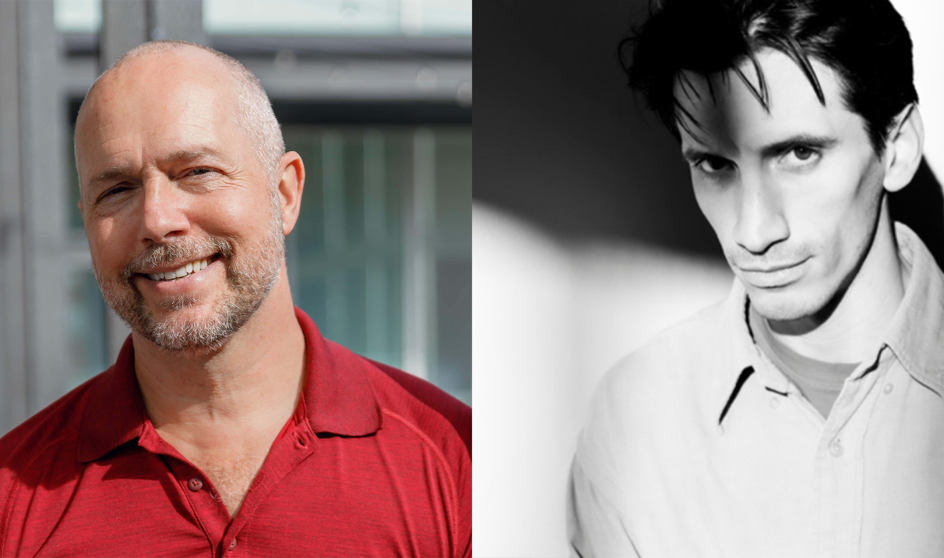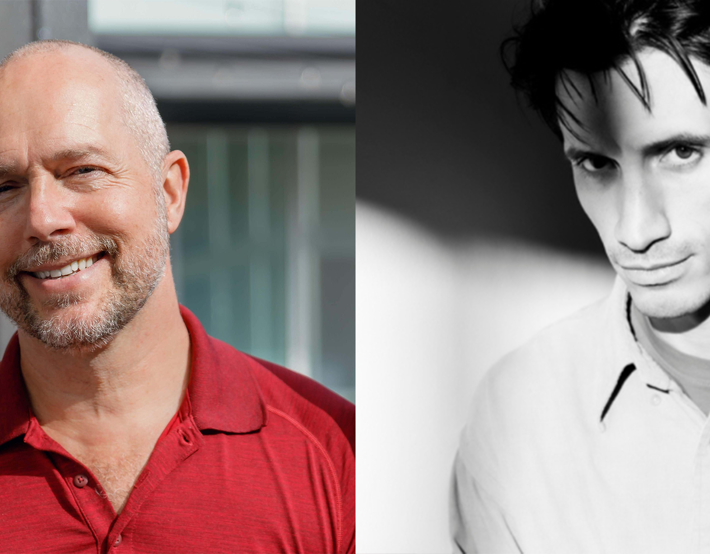
40 years of Korzo: Paul Selwyn Norton and Simon Bus in conversation

A lot can happen in forty years! We’re celebrating 40 years of Korzo in 2024 and do so by reflecting on the past and looking forward. In this double interview we reflect on the position of the maker and choreographer with two makers who’ll work together for our anniversary programme: longtime Korzo-maker and friend Paul Selwyn Norton (59) and dancer and choreographer Simon Bus (34). ‘Korzo has been my spine.’
Morning has broken in The Hague, while the night is on it’s way in Sydney. A Zoom-call with a massive time difference: Paul has been living in Australia for some years now and dials in for a conversation with Simon, who is just getting ready for rehearsals. Paul is bringing back his Korzo-debut Johnny Panic (1992) for our anniversary programme with Simon as one of the dancers. So rehearsals are digital now, with Paul dressed in a fitness tanktop; after our convo, the heat is on.
Hi Simon and Paul! You’re both dancers and makers, albeit with different lengths of your respective careers. What would you consider a key moment in your career as a maker?
Simon: ‘Getting asked to make a solo for CaDance in 2019 was a key moment. I made a solo and played it a lot. I created a work that was really easy to sell, because I could basically play it anywhere. For CaDance I performed it in a car garage. I remember it was an important moment to get my name out there as maker. In the beginning, people only see you as a performer. But now it’s organically shifting more and more into less performing and more creating. I’m forcing that a bit as well. I’m 34 now and the body feels different. Especially since I had quite a long breakdance career.’
Paul: ‘That’s the synergy between Simon and myself, we were both breakdancers before we became choreographers. I was never trained in an academy, so I don’t have a prescribed pathway into the sector. I got there via breakdancing. And if you’re breakdancing, you’re always creating in the moment. So from a makers point of view a key moment was when I was dancing in the Roxy in Amsterdam back in the 80’s, 90’s, and was spotted by someone from the company Cloudchamber. They needed someone for a show and said: ‘can you come and dance with us?’ And I said: ‘I’m not trained, I won’t be able to pick up your steps’. But they told me they weren’t interested in that, they wanted me to explore my creativity as a performer. That was an amazing moment. I stepped away from my studies and went fully into being an artist.’
‘I have several of these key moments. Another one was Leo Spreksel seeing Johnny Panic in Rotterdam and immediately went: ‘Ok, I want you for CaDance 1992, here’s the opportunity, here’s money.’ Johnny Panic was a launchpad for my first steps into interrogating my own capacities as a maker in Holland under my own name. So Leo Spreksel, a brilliant supporter, amazing human being, booking me for CaDance was a huge honour and a massive learning curve.’
‘Later on I had more of this moments, with Ohad Naharin from Batsheva Dance Company booking me after seeing half an hour of my rehearsal, or Bill Forsythe who saw my work in Paris and asked me to come and make work for Ballett Frankfurt. I have never went into auditions as a dancer, but always came in as a choreographer and found my way into performing. Completely the reversed passage then would be normal.’
What is the role that Korzo played in your careers?
Simon: ‘Like I said, the CaDance-solo was really important. And as a dancer I danced in Shailesh Bahorans Agori, that’s where Stacz (Wilhelm, former artistic director) and Johanna (Korgel, former productionmanager and festival coordinator) saw me and that’s why they asked me to do the solo. I actually moved to the Hague last year. I like the city and Korzo is part of it. Korzo has been there during my career so far.’
Paul: ‘Korzo produced several pieces of mine along the way. I would leave and come. Korzo has been a consistent support mechanism and just a great ally and friend. It really has been my family. I was cradled as beginner and every time I came back with a little bit more resource, more capacity and I would step up. It was a beautiful relationship across the 20 or so years. Crucial. Korzo has really been my spine.’
Taking breakdance seriously
How have you seen the role of the choreographer and maker change over time?
Simon: ‘I find that hard to answer, I’m still quite fresh compared to Paul. The only thing I see, when I was breakdancing as a teenager, that was more considered amateur art. When a company had to do something with amateur funds, they would reach out to local breakdancers. That’s how I got my first taste of working with choreographers, a choreographer reaching out to our crew. We found it a bit insulting at first, like, you’re seeing us as amateurs? We train every day? Now I see that there’s a lot more credit being given to these type of arts. I see a surge in people that come from a non-academic background and there’s more respect for those artists. It’s kind of interesting that Paul did it that early as a non-trained dancer.’
Paul: ‘I’m just going to riff on what Simon said there. It’s fantastic that the industry has embraced breakdancing and streetdancing as a valid vernacular, valid language. Ballet can hold narrative, but breakdancing can tell great stories as well. Ballet harkens back to history, but breakdancing is an extraordinary example of a language that speaks to the now and is very on the edge.’
‘Here in Australia you can see a similar thing with the appreciation of Aboriginal culture of the first nations. Aboriginal dancing has been storytelling for more than 40.000 years. I love that there’s this invitation to bring other dance languages into equity with ballet and contemporary dance. That’s the revolution we’re going through.
‘Another change is the rise of social media. You can instantly absorb other people’s languages and cultures and appropriate and talk through other’s peoples languages in a heartbeat.’
Simon: ‘It would be much harder for me to have a career without social media. When I first got into the scene, there were a lot of casting calls. I never felt like: ‘oh, this is something I can audition for, they’re looking for contemporary trained dancers with a certain technique’. Social media nowadays functions as a public cv for me. On my Instagram people get a much better sense of me as an artist. And I find my own dancers through social media. It always gives me a good idea of how people are. So far I have never felt like there was a really big difference in how they are online and how they are in real life.’
Korzo as a garden
The Korzo-model nowadays is that we’re a theatre and production house, with in-house makers and makers that come in to do residencies. What do you feel would be the ideal model for Korzo, to make sure that talent can blossom? Or is this model already ideal?
Simon: ‘Honestly, I’ve never giving that much thought. I can say what I like about the current Korzo. Even if you’re not an in-house maker, you can still come here and talk with people and ask how Korzo can help. I like that there are residencies for makers. So the door is still open for makers who are not in-house makers. I’m using the studios from time to time and I always feel welcome.’
Paul: ‘My immediate answer would be… I’ll put it a different way. I love growing my own food. As a gardener, you have to know each plant has it’s particular demands. You have to be responsive to the context, the soil, but also the various plants. Institutions also sit in a context, a city, a culture. They have to be porous to that context. They can’t come with fixes notions and ideas. They have to live and breathe in their community. Each artist that you invite into your garden, will need specific requirements. That above all requires real authentic conversation, so you understand each other. If it’s not living and breathing in it’s context and culture, it’s dead in the water.’
You can see the performance of Johnny Panic during our anniversary programme Korzo was Corso: celebrating 40 years of an adventurous theatre. The event is sold out, but you can check out Korzo’s history in a free expo in Korzo Club.
Check this
Check this

Korzo UP#6 with Zino Schat
“This world makes it difficult for men to show vulnerability.” We meet Korzo maker, choreographer, dancer, sound designer, dance teacher, and jewelry maker Zino Schat on a gray Thursday in the...
Read more
Rewire is pleased to unveil a second wave of 30 artists and projects
Rewire is pleased to unveil a second wave of 30 artists and projects joining the line-up for its 15th anniversary edition, taking place from 9 to 12 April 2026 across different The Hague venues. Like...
Read more